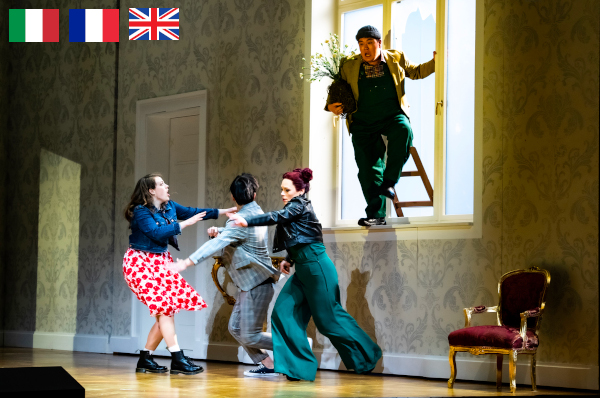The children are watching us
by Susanne Krekel
Nürnberg, 15.04.2023 - Emotions are running high tonight and can distinctly be felt: Joana Mallwitz will conduct her last opera première here. The Nuremberg public is conscious of the occasion and warmly welcomes the conductor as she enters the stage and takes a bow. Meanwhile, on stage, a young woman is leaning against a pillar and lights a cigarette. We have time to register a pair of torn black jeans, a revealing top in black and silver, a black hoodie, pink hair and a black baseball cap, the conductor lifts her magic wand, and they are off. This conductor’s baton is really a torch with which Joana Mallwitz will illuminate the most hidden corners of the score, making it transparent, like a three-dimensional building. In the same sense, stage director Jens-Daniel Herzog adds one, or even more dimensions to the piece: by giving a child to the noble couple of Almaviva, and through the interactions of the characters with the little girl, he shows us the action from a radically new angle.
The set consists of two large rooms, separated by two walls that can be moved aside to create a third one, and united by two doors. In each room there is only one piece of furniture, an armchair, modern, angular and leather in the Count’s boudoir, a red-and-gold rococo antiquity in the Countesses. Mathis Neidhart, who is also responsible for the costumes, creates thus a link between our time and Mozart’s. The entire action takes place in those two rooms, except for Act IV, played out in the dark on an almost empty stage, and often we can follow two actions simultaneously - while the Countess sings her aria ‟Porgi amor”, in her husband’s boudoir Basilio gives a recorder lesson to her daughter, etc. This way, the stage director gives to the characters a life beyond their official appearances and shows us the wheels that drive everything. Moreover, the characters are effectively defined by their costumes: casual chic for the Count and Countess, blue suit and t-shirt for him, with blue-tasseled brown loafers, while she wears a green trouser suit and a black leather jacket. Susanna wears a white and red floral summer dress under a jeans jacket and black Doc Martens with white socks, and Figaro appears in a checked suit, white T-Shirt and blue tennis shoes. We are clearly in the presence of real-life people of our own time, who will live through a crazy day that will leave none of them unscathed. The piece is a comedy however, with all the necessary elements, cross-dressing, games of hide-and-seek, unexpected appearances, all of them following each other in a breathless tempo. Joana Mallwitz and the Staatsphilharmonie Nürnberg are keeping it up, without neglecting any of the laughing details of the score, and adding to the suspense by well-balanced moments of dramatic silence. Delicate pianissimi, precise and energetic sforzandi - everything is as it should be, the balance is perfect between singers and orchestra.The fluid precisions of Joana Mallwitz’s work delights and enchants, and rarely can a cough be heard, a certain sign for a captivated public. Captivating are also the singers, wonderful voices and great stage play throughout. From the Count Almaviva to the flower girls, not to forget the mute role of the noble child (brava, Ottilie Herzog!), they are simply impeccable. Samuel Hasselhorn, elegant and strong barytone and stage presence, is the Count Almaviva. Emily Newton’s Countess is touching in her distress, and for once we see a certain ambiguity in her relationship with Susanna, who, after all, is not only her accomplice but also a rival.Susanna is interpreted by Julia Grüter, who abandons herself completely, with a rich and creamy voice - this Susanna is full of life and will not be trifled with. Wonyong Kang sings an agile and self-assured Figaro with a lovely light and supple barytone, and Corinna Scheurle is simply amazing as Cherubino. We might be in the presence of an adolescent boy, even if her lovely mezzo voice indicates the contrary - the game of hide-and-seek works also between genders. The stage direction, we already mentioned it, also brings to life the secondary characters, since their motivations also contribute to the action. Thus, tonight we see a blundering, absurd and comical Antonio, but who is also worried about his daughter, played by Seokjun Kim; we see an arrogant Basilio (Hans Kittelmann) and a couple Marcellina - Bartolo (Almerija Delic and Taras Konoshchenko) who are not exactly enthusiast about the sudden acquisition of an adult son. Veronika Loy is a convincing Barbarina, and her aria in Act IV reveals a warm and rich voice.
Prima la musica, poi le parole? Tonight, the old question finds an answer in a perfect balance between text and music, especially as the recitatives were treated with all due respect, accompanied with precision and sensitivity on the harpsichord by Daniel Rudolph. Tonight we have enjoyed a memorable night of musical theatre in its truest sense. Curtain calls and thunderous applause were well deserved indeed - bravi tutti!


